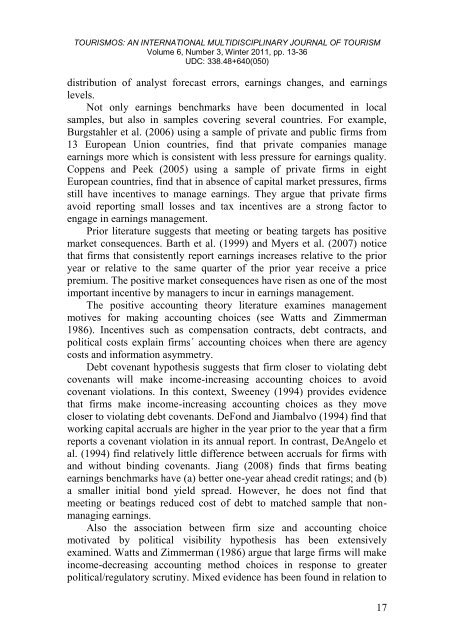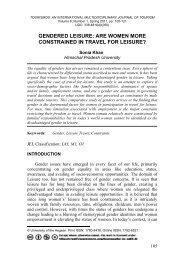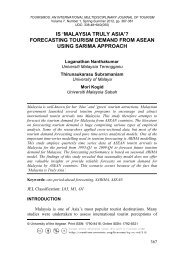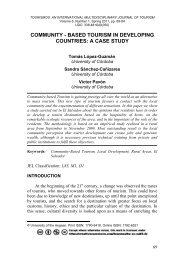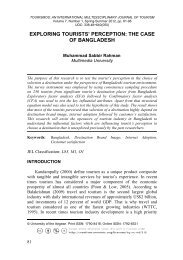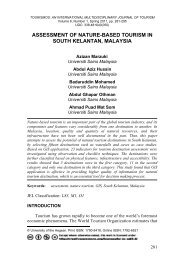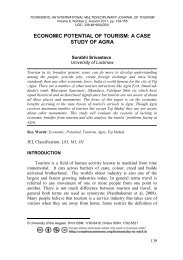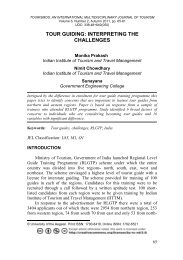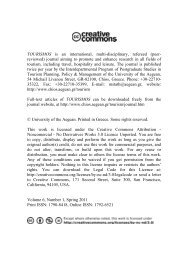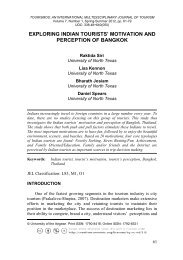COMMONS DEED
COMMONS DEED
COMMONS DEED
Create successful ePaper yourself
Turn your PDF publications into a flip-book with our unique Google optimized e-Paper software.
TOURISMOS: AN INTERNATIONAL MULTIDISCIPLINARY JOURNAL OF TOURISM<br />
Volume 6, Number 3, Winter 2011, pp. 13-36<br />
UDC: 338.48+640(050)<br />
distribution of analyst forecast errors, earnings changes, and earnings<br />
levels.<br />
Not only earnings benchmarks have been documented in local<br />
samples, but also in samples covering several countries. For example,<br />
Burgstahler et al. (2006) using a sample of private and public firms from<br />
13 European Union countries, find that private companies manage<br />
earnings more which is consistent with less pressure for earnings quality.<br />
Coppens and Peek (2005) using a sample of private firms in eight<br />
European countries, find that in absence of capital market pressures, firms<br />
still have incentives to manage earnings. They argue that private firms<br />
avoid reporting small losses and tax incentives are a strong factor to<br />
engage in earnings management.<br />
Prior literature suggests that meeting or beating targets has positive<br />
market consequences. Barth et al. (1999) and Myers et al. (2007) notice<br />
that firms that consistently report earnings increases relative to the prior<br />
year or relative to the same quarter of the prior year receive a price<br />
premium. The positive market consequences have risen as one of the most<br />
important incentive by managers to incur in earnings management.<br />
The positive accounting theory literature examines management<br />
motives for making accounting choices (see Watts and Zimmerman<br />
1986). Incentives such as compensation contracts, debt contracts, and<br />
political costs explain firms´ accounting choices when there are agency<br />
costs and information asymmetry.<br />
Debt covenant hypothesis suggests that firm closer to violating debt<br />
covenants will make income-increasing accounting choices to avoid<br />
covenant violations. In this context, Sweeney (1994) provides evidence<br />
that firms make income-increasing accounting choices as they move<br />
closer to violating debt covenants. DeFond and Jiambalvo (1994) find that<br />
working capital accruals are higher in the year prior to the year that a firm<br />
reports a covenant violation in its annual report. In contrast, DeAngelo et<br />
al. (1994) find relatively little difference between accruals for firms with<br />
and without binding covenants. Jiang (2008) finds that firms beating<br />
earnings benchmarks have (a) better one-year ahead credit ratings; and (b)<br />
a smaller initial bond yield spread. However, he does not find that<br />
meeting or beatings reduced cost of debt to matched sample that nonmanaging<br />
earnings.<br />
Also the association between firm size and accounting choice<br />
motivated by political visibility hypothesis has been extensively<br />
examined. Watts and Zimmerman (1986) argue that large firms will make<br />
income-decreasing accounting method choices in response to greater<br />
political/regulatory scrutiny. Mixed evidence has been found in relation to<br />
17


